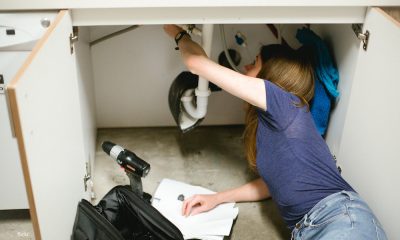Trends
7 Ways to Make Your Home More Energy Efficient

With climate change forefront of many people’s thoughts, mindful citizens are constantly looking for ways in which they can help ease their carbon footprint and live more sustainably.
One of the many ways this can be done is by curbing energy consumption. Some people may think that an energy efficient house is too expensive to maintain but the reality is that living efficiently does not necessarily mean letting go of the comforts that you’ve become accustomed to, it just means some smart adjustments need to be made.
The largest consumption of household energy is from heating and cooling devices depending on the season. Making slight adjustments to your house can make a big difference in the amount of energy these devices consume.
1. Natural ventilation
Make use of natural breezes by creating airflow with strategically placed windows which will decrease the need to use air conditioners in summer. Invite the outside in, and open up windows while you’re home and let air flow through naturally.
2. Replace old windows and frames
Older windows may be charming and lend itself to a certain aesthetic but if they’re not maintained and rickety, they can be a source of energy loss. By replacing those aluminum frames with vinyl frames and double pane windows you will save a lot of money over time because they seal tighter. A tighter seal will prevent cold or hot air from escaping your home thus resulting in less energy consumption by the heating or cooling system.
3. Landscaping
Planting trees will not only add curb appeal but it will also help cool your house down in summer and blocks the wind in winter. Trees will provide shade that prevents concrete surfaces from absorbing so much heat. You’ll get less heat coming off of the ground at night and the result is a cooler house that lessens the need for the use of a cooling system.
4. Incorporate Zoning
The smaller the space that needs to be heated or cooled, the less energy is used. Open plan spaces take longer to reach a set temperature, and use more energy than a smaller space that can be closed up. Making zones in the house that can be closed off while using an air conditioner will mean the air heats or cools faster. Make sure that doors and windows are closed and that there aren’t too many cavities where air can slip through.
5. Solar Panels
Solar energy panels may appear to be an expensive option at first glance. But the units are durable and won’t need to be replaced for a long time. You will also be saving more money on electricity bills over time making it a valuable investment.
Solar panels use natural light resources from the sun to create energy. Solar thermal collectors use energy from the sun to heat water in the water heating system. Ultimately, they’re an efficient, money saving option for any household.
6. Energy efficient lighting
Replace light fixtures in the home with energy saving lights. Switch out incandescent light bulbs with fluorescent light bulbs. This is because fluorescent light bulbs use less energy and last longer. You can also use modern dimmers which cut the energy supply on and off rapidly and decreases the amount of energy that reaches the lightbulb. This makes the bulb last longer and cuts down on the amount of energy the light would normally use.
7. Be Mindful of Energy Usage
A large amount of energy usage can be cut down by just changing certain behaviors and being aware of how much energy we use. Only switch on lights in rooms that are occupied, and remember to switch them off when you leave. Unplug electronic devices that are not being used as they use energy even if they aren’t turned on.
When it is time to replace your appliance, buy ones that have an energy saving label on them. They have been certified to use less energy than older ones you may already have in your home. They may be expensive but you will see the difference when the energy bill comes.
An energy efficient house is not only good for the environment but it’s also easy on your pocket in the long run. You might take on some big expenses to begin with, but in the long run it saves you as well as the environment.





